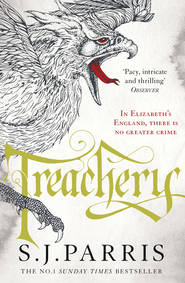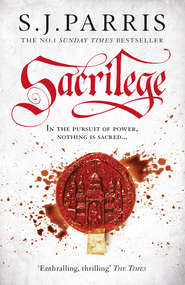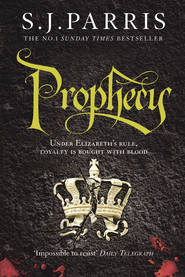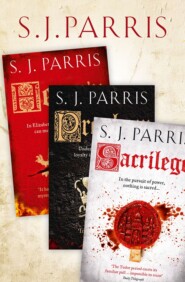По всем вопросам обращайтесь на: info@litportal.ru
(©) 2003-2024.
✖
Heresy
Автор
Год написания книги
2019
Настройки чтения
Размер шрифта
Высота строк
Поля
‘Well, you must ask Master Godwyn, our librarian, to show you the collection – he will be delighted to share his knowledge, I’m sure. But for now you must be longing to change your clothes and take supper. And if you want to have a shave first –’ here he cast a critical eye over my hair and beard – ‘we have a barber in the college. The porter will let you know where to find him. Usually the senior Fellows and I dine in hall with the undergraduates, but it is a noisy affair and for your first evening in Oxford I thought you might prefer something more sedate. Therefore I would like to invite you to join my family and a few select guests to dine in my own lodgings, which you see there next to the hall, abutting the south range.’
‘Your family?’ I said, surprised. ‘You are not a bachelor, then?’
‘We are no longer a community of clerics here in Oxford, Doctor Bruno,’ he said with a modest laugh. ‘Priests of the Church of England may marry – in fact, Her Majesty positively encourages them to do so, to further distinguish themselves from those of the Roman faith – and likewise for the heads of colleges here, though I admit we are still very much in the minority. I suspect it is not a life to tempt many wives – university society is somewhat limited for ladies – but my dear Margaret is a rare woman and professes to have been happy enough here these past six years, excepting …’ Here he broke off and it was as if a cloud passed over his face, before he resumed, in a lighter tone. ‘She does not dine with us in hall, according to the regulations, so she is always delighted to be able to entertain guests in our own rooms. I shall go now and tell her you are arrived, and call a servant to show you to your room. Perhaps in an hour you would like to make your way over – just go through that right-hand archway beside the hall and you will see a wooden door off the passage.’
We had no sooner moved out from the shelter of the gatehouse arch to venture through the rain across the quadrangle than we were interrupted by an urgent cry.
‘Rector! Rector Underhill – wait, I pray you!’
From the north side of the quadrangle a figure was running towards us, a tattered black scholar’s gown fluttering behind him, with a paper in his hand which he brandished as if there were some imminent emergency. I noticed the rector’s face set tight for a moment in annoyance. The young man slid to a halt in front of us on the wet flagstones and I saw that he was perhaps twenty years of age, and very shabbily dressed, his shirt and breeches patched and his shoes thin and worn through at the toe. He looked from me to the rector with an expression of great anxiety and said, breathlessly,
‘Rector Underhill, is this your esteemed visitor from the court? I beg you, give me leave to speak to him.’
‘Thomas,’ the rector looked supremely irritated, ‘this is neither the time nor the place. Kindly show some decorum before our guest.’
To my surprise, the boy then turned to me, dropped to his knees there on the wet ground and clutched the hem of my cloak in one hand, pressing his scrap of paper into my hand with the other.
‘My lord, I beseech you, take pity on one whom God has forgotten. Give this letter to your uncle, I beg of you, and ask him to pardon my poor father and let him return, please, my lord, if you have any Christian compassion, grant me this favour and take his suit to the earl, tell him Edmund Allen repents of his sins.’
There was a wildness in his eyes, and his evident distress moved me. Guessing his misunderstanding. I laid a hand gently on his head.
‘Son, I would gladly help, but my uncle was a stonemason in Naples, I cannot imagine he would be much use to you. Come.’ I took his hand and helped him to his feet.
‘But …’ He started at my accent, then his face reddened violently and he looked at me in an anguish of confusion as he realised his mistake. ‘Oh. I beg your pardon, my lord. You are not Sir Philip Sidney?’
‘Alas, no,’ I said, ‘though I am flattered you should mistake us – he is a good half-foot taller than I, and six years younger. But I will see him tomorrow, most likely – is there some message I might convey to him?’
‘Thank you, Doctor Bruno, that is kind but it won’t be necessary, this is no more than an impertinent intrusion,’ the rector cut in brusquely. Then he turned to the boy with barely suppressed anger. ‘Thomas Allen, have some care for your manners. I will not have you assaulting guests of the college. Must you be disciplined again? Do not forget how fragile is your position here. Back to your studies, Master Allen – or else I’m sure you must have some servant’s duties to attend to. You will not trouble Doctor Bruno again during his stay, do you understand my meaning?’
The boy nodded miserably, lifting his eyes briefly to see if I was in agreement with the rector’s harsh words. I tried to convey my sympathy in my face.
‘And look to your dress, boy,’ the rector called after him as he sloped away, defeated. ‘You shame the college looking like a beggar as you do.’
The boy turned then, mustered what little scrap of dignity remained to him and said, with his head high,
‘I cannot afford new clothes, Rector Underhill, and you well know why, so do not ask me to apologise for what is no fault of my own.’ Then he disappeared into one of the staircases on the west range.
The rector stood looking after him for a moment, perhaps shamed by his own severity.
‘That poor boy,’ he said eventually, shaking his head.
‘Why poor?’ I asked, curious. ‘Who is he?’
‘Let us step inside your staircase here, it will not do for you to have another soaking,’ he said, motioning to the furthest archway on the south range. We ducked into its shadows out of the rain. ‘It is a sad story, that boy has suffered much for one so young. I am sorry you were troubled by him.’
I shook my head; I was intrigued by the boy’s words.
‘His name is Thomas Allen. His father, Doctor Edmund Allen, was a Doctor of Divinity here in Oxford and my sub-rector in the college last year.’
‘Are all the Fellows permitted to live with their families?’ I asked in surprise.
‘Not at all, only the heads of colleges. Edmund had moved away and taken a living at one of the London churches when he married. He only returned to Oxford after his wife died and Thomas, being then too young to matriculate, lodged with a family in the town.’ He shook his head again in a show of pious sorrow. ‘Edmund Allen was a good man – appointed by the Earl of Leicester himself, you know, as was I.’
‘The senior positions are not appointed through election by the Fellows?’ I asked, affecting innocence.
‘In normal circumstances, yes,’ he replied, looking embarrassed. ‘But there were many entrenched papists remaining in high office here – some of them appointed by Queen Mary herself and still unrepentant – so to weed them out, the earl began placing his own men to ensure loyalty to the English church, until such time as the canker of popery could be cut out altogether. I was his personal chaplain prior to my position here.’ He smiled, and couldn’t resist a little strut of pride.
‘And this was a popular choice among the senior university men?’
‘No, since you ask. But we must all rely on patronage, one way or another,’ he replied, somewhat ruffled. ‘Edmund Allen was also appointed by the earl at my recommendation – we had been undergraduates together here. So you may imagine our distress when it was discovered last year that he too was secretly practising the old religion – and not so secretly, neither, for he was discovered in possession of forbidden books and had for some time been corresponding with the Catholic seminaries in France.’
‘Is this a crime?’
‘If he could have been proven to have known about or aided the secret arrival of missionary priests from France, he would have been for the scaffold. But there was no evidence against him on that count, only hearsay, and no confession could be got from him under questioning.’
‘Was he punished?’
‘His questioning was hard, but his punishment light, in the circumstances,’ said the rector, pursing his lips. ‘The earl was outraged, as you may suppose – Allen was deprived of his fellowship immediately, but the earl is merciful and he was offered safe passage to leave the country, not to return on pain of imprisonment. He went to France and took up residence at the English College in Rheims.’
‘Rheims? I have heard of it. That was founded by a William Allen, was it not?’
‘A cousin, yes. They are one of the old Catholic families. But Edmund Allen’s son Thomas, whom you had the misfortune to encounter just now, was then in his first year as an undergraduate here. He did not follow his father into exile – Thomas wished to complete his studies, but there were many in the college who felt he should be expelled simply by connection with his father’s disgrace.’
‘It would seem harsh to punish a son for his father’s beliefs. Does he share them?’
‘One never knows. All students must swear the Oath of Supremacy acknowledging Her Majesty as the head of all religious authority in the realm, but you know as well as I that a man may sign a paper with his hand and hold something different in his heart. Thomas Allen was questioned hard about his doctrines, you may be sure.’ The rector nodded significantly.
‘He was tortured?’ I said, appalled.
The rector stared at me in horror.
‘Good God, no – do you think us barbarians, Doctor Bruno? It was merely questioning – though the manner of it was not pleasant, I will admit. He was pressed on points of theology even a Doctor of Divinity would find hard to answer, and every aspect of his responses held up to scrutiny. But his father’s expulsion had been so public that the college authorities had to be seen to be utterly scrupulous with the son – we could not be accused of turning a blind eye to a known papist in our midst.’
‘He passed the test, I gather, by his continued presence here?’
‘Eventually it was decided that he could stay on, but at his own expense – his scholarship was withdrawn.’
‘Did the family have means?’
The rector shook his head.
‘Almost nothing after Edmund had paid his fines for religious disobedience. Young Thomas has done what many poor scholars in the university must do – he pays his board by acting as a servant to one of the wealthy commoners – sons of gentry and nobles who pay to study here.’ The scornful curl of his lip expressed his opinion of these commoners.
‘So one moment this Thomas is a scholarship student, the son of the sub-rector, the next he is living on crumbs, a servant to one of his friends? A hard reversal of fortunes for any man, especially one so young,’ I said, with feeling.
‘Such is the way of the world,’ the rector said pompously. ‘But it is sad, he is a bright boy and always had a cheerful disposition. He might have done well in the world. Now he is as you saw him. He writes endless petitions to Leicester to pardon his father – I find them pushed through the door of my lodgings and my private office. I have told him I’ve done all I can with regard to the earl, but he only grows more determined. It has become an obsession with him and I almost fear he may lose his wits over it. And I do pity him, Doctor Bruno – you must not think me stony-hearted. There was even a time I considered he might be a suitable match for my own daughter – his father wanted him to go into the law and his prospects seemed fair. Our families had been friends, and Thomas was certainly much taken with Sophia.’
I wondered if having a daughter of marriageable age in this cloister of young men might account for the slightly harried expression that permanently troubled the rector’s face.











